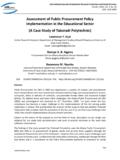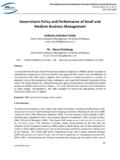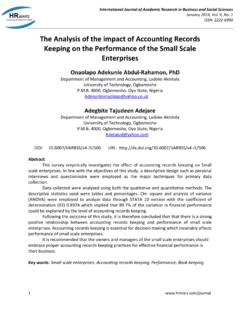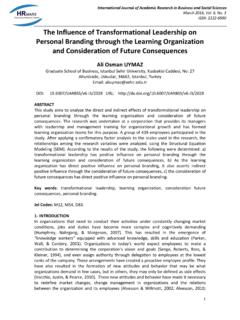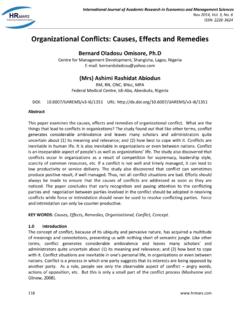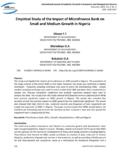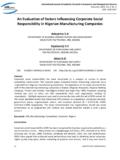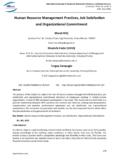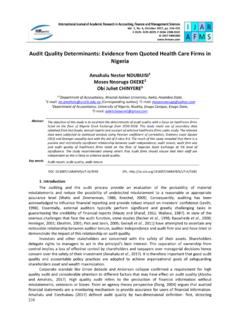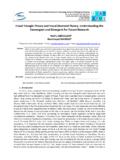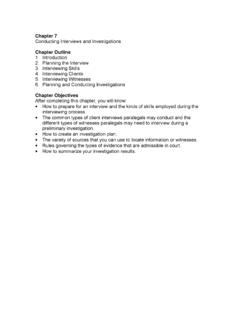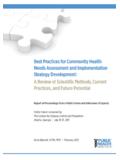Transcription of Piloting for Interviews in Qualitative Research ...
1 International Journal of Academic Research in Business and Social Sciences 2017, Vol. 7, No. 4. ISSN: 2222-6990. Piloting for Interviews in Qualitative Research : Operationalization and Lessons Learnt Mohd Aliff Abdul Majid1*, Mohhidin Othman2, Siti Fatimah Mohamad3, Sarina Abdul Halim Lim4 and Aziz Yusof5. 1 Department of Foodservice Management, Faculty of Hotel and Tourism Management, Universiti Teknologi MARA Puncak Alam, 42300 Selangor, Malaysia 1,2,3,5 Department of Food Service and Management, Faculty of Food Science and Technology, Universiti Putra Malaysia, 43400 UPM Serdang, Selangor, Malaysia 4 Department of Food Technology, Faculty of Food Science and Technology, Universiti Putra Malaysia, 43400 UPM Serdang, Selangor, Malaysia DOI: URL: ABSTRACT. Qualitative Interviews offer rich and detailed information in understanding people's experiences. However, Qualitative inquiry might be difficult for inexperience researcher to adequately perform the interview .
2 Piloting for interview is an integral aspect and useful in the process of conducting Qualitative Research as it highlights the improvisation to the major study. This article discusses the importance of pilot study, the methods undertaken and the lessons learnt throughout the process. The pilot interview was conducted with two offshore catering employees, as preparation for a dissertation in developing a job satisfaction instrument for offshore catering employees in Malaysia. The useful functions of pilot study are described and in highlighting the advantageous of pilot study, this paper describes the modification made for the major study as a result of the pilot work. These comprise (1) criteria for selecting potential participants, and (2) improving the interview guide, particularly the interview questions. Keywords: Qualitative , Pilot Study, interview , Job Satisfaction, Offshore Catering INTRODUCTION.
3 Numerous studies employed Qualitative approach to investigate people's subjective experiences, opinions and beliefs that cannot be measured statistically (Percy, Kostere &. Kostere, 2015). In all forms of the paradigm, most data are collected using Interviews and necessary to allow the researcher to understand the phenomenon from the person's account (Merriam, 2016). Unlike quantitative study, researcher is the primary instrument in the data generation (Paisley & Reeves, 2001) and interview questions are at the heart of interviewing. Moreover, an in-person interview is widely acknowledged as a suitable technique for Qualitative inquiry to seek insights of those who have experienced or are experiencing the phenomenon (Collingridge & Gantt, 2008; Wimpenny & Gass, 2000). Thus, Piloting for Interviews is crucial to test the questions and to gain some practice in interviewing. 1073. International Journal of Academic Research in Business and Social Sciences 2017, Vol.
4 7, No. 4. ISSN: 2222-6990. Pilot studies are commonly associated with quantitative approach to test of a particular Research instrument. Apparently, the importance of pilot work has been expanded to Qualitative inquiry where it is carried out as preparation for the major study. Pilot studies are useful procedures as preparation of a full-scale study, regardless of paradigm (Tashakkori &. Teddlie, 2003). It can be employed to address potential practical issues in the following Research procedures (Van Teijlingen & Hundley, 2002) and trying out the questions. Moreover, in Castillo-Montoya's (2016) pilot study, she found that interview protocols could be strengthened through Piloting the Interviews . It can help identify if there are flaws, or limitations within the interview design that allow necessary modifications to the major study (Kvale, 2007). Nonetheless, pilot work was inadequately reported in the literature (Van Teijlingen, Rennie, Hundley, & Graham, 2001).
5 Harding (2013) stated that the need for Qualitative Interviews to be piloted is not relatively obvious because as the Interviews progressed, the quality of the interview guide improved. However, he mentioned that it is distinctly helpful to pilot the interview questions and adjust the interview guide accordingly before embarking into major study. The interview guide is an important aid that keeps the researcher with needed consistency (Krauss, Hamzah, Nor, Omar, Suandi, Ismail & Zahari, 2009). Based on the recommendation, therefore, researcher decided to pilot the Interviews . It is important to note that this is a methodological article, where researchers do not discuss the findings from the study, as it will be presented elsewhere. Researchers believe that incorporating the discussion of the findings would be more diverting rather than informative. The background of the current study is presented, however the focus is mainly on the operationalization of the pilot study and lessons learnt throughout the process.
6 BACKGROUND OF THE STUDY. Over the past years, a range of job satisfaction instrument have been developed and applied in various contexts. Despite the prevalence of Research on job satisfaction in various areas and measures to assess employee's job satisfaction, there is unlikely a specific instrument for offshore catering and little is known about how working in offshore catering sector affect employee's job satisfaction (Majid, Othman, Mohamad & Lim, 2016). The simplest method to measure job satisfaction might be asking people whether they are satisfied or dissatisfied with their job, nevertheless, such approach is inappropriate to capture the essence of the specific attributes of a particular phenomenon (Sarris, 2008). Furthermore, using existing instruments without properly reflecting the cultural differences might affect the validity of the instruments used ( zpehlivan & Acar, 2015).
7 Thus, the present study is taking an effort to develop and validate a bespoke job satisfaction instrument for offshore catering employees, specifically in Malaysia. The present study is crafted based on exploratory sequential mixed methods design (Creswell, 2013), signifying that the study is divided into two phases in which begin with Qualitative phase and followed by quantitative phase. For the current paper, it was conducted at the initial stage of Qualitative phase as part of an ongoing dissertation in developing job satisfaction instrument for offshore catering employees. 1074. International Journal of Academic Research in Business and Social Sciences 2017, Vol. 7, No. 4. ISSN: 2222-6990. METHODS. This paper explains the steps carried out that help researcher to obtain necessary information to address the aim of the study. Figure 1 describes the process undertaken. Each step assists researcher to develop an appropriate interview guide for the major study and each step therefore, is discussed.
8 Determine clearly interview questions Have the initial interview questions reviewed by experts Selecting the participants Piloting for Interviews Report the modification made Figure 1: Steps in conducting the pilot study Determine clearly interview questions The interview was guided by open-ended questions on issues related to motivation, job experiences and job satisfaction. Initially, the interview framework was devised based on the work of Schriesheim and Tsui (1980), Andrews and Withey (1976) and, Taylor and Bowers (1974). For the purpose of this article, the main question was: How do you generally feel about your current job? Basically, researcher focused on ensuring the interview questions are constructed to answer the Research question. This process can increase the effectiveness of the interview questions and ensure its significance to achieve the aim of the study (Castillo- Montoya, 2016).
9 It is important to ensure that researcher has included questions necessary to measure the concept (Dikko, 2016). The interview protocol encompassed open-ended questions and then was emailed for expert reviews. Have the initial questions reviewed by experts Subsequently, the supervisory committee members reviewed the interview questions pertaining to its language, wording and relevance. At this point in the process, one question was modified accordingly due to leading question. Following the initial reviews, the questions 1075. International Journal of Academic Research in Business and Social Sciences 2017, Vol. 7, No. 4. ISSN: 2222-6990. comprised of seven central questions were tested in the pilot work and researcher used probing questions to explore the participants' views that require further clarifications. Selecting the participants Permission sought to engage the employees from one offshore catering company located in Klang Valley, Malaysia.
10 A formal letter was sent to the organization's representative personnel and an approval letter was obtained. In pilot Interviews , Turner (2010) suggests that the participants should share as similar criteria as possible to the group of participants for the major study. Likewise, Hennink, Hutter and Bailey (2011) also share similar notion. Researcher had given the inclusion criteria of participant beforehand and the offshore catering employees were identified by referrals from the respective organization. It signified that the participants were selected based on purposive sampling and willingness to participate. An effort was made to interview two male employees of different positions. Table 1 summarizes the demographic characteristics of the participants. Table 1: Offshore catering employee profiles Pseudonym Age Gender Education Position Approximate no. of trips involved 1 Mark 40 Male Diploma Western More than 10.
